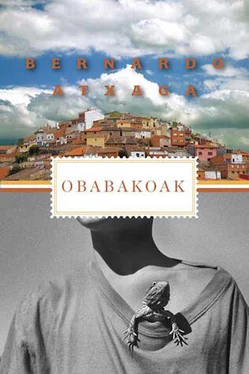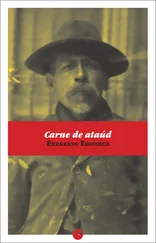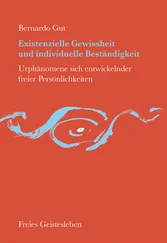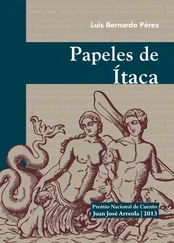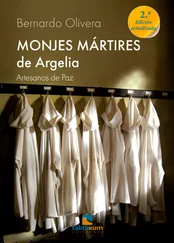Bernardo Atxaga - Obabakoak
Здесь есть возможность читать онлайн «Bernardo Atxaga - Obabakoak» весь текст электронной книги совершенно бесплатно (целиком полную версию без сокращений). В некоторых случаях можно слушать аудио, скачать через торрент в формате fb2 и присутствует краткое содержание. Год выпуска: 2010, Издательство: Graywolf Press, Жанр: Современная проза, на английском языке. Описание произведения, (предисловие) а так же отзывы посетителей доступны на портале библиотеки ЛибКат.
- Название:Obabakoak
- Автор:
- Издательство:Graywolf Press
- Жанр:
- Год:2010
- ISBN:нет данных
- Рейтинг книги:3 / 5. Голосов: 1
-
Избранное:Добавить в избранное
- Отзывы:
-
Ваша оценка:
- 60
- 1
- 2
- 3
- 4
- 5
Obabakoak: краткое содержание, описание и аннотация
Предлагаем к чтению аннотацию, описание, краткое содержание или предисловие (зависит от того, что написал сам автор книги «Obabakoak»). Если вы не нашли необходимую информацию о книге — напишите в комментариях, мы постараемся отыскать её.
Obabakoak
The Observer
Obabakoak — читать онлайн бесплатно полную книгу (весь текст) целиком
Ниже представлен текст книги, разбитый по страницам. Система сохранения места последней прочитанной страницы, позволяет с удобством читать онлайн бесплатно книгу «Obabakoak», без необходимости каждый раз заново искать на чём Вы остановились. Поставьте закладку, и сможете в любой момент перейти на страницу, на которой закончили чтение.
Интервал:
Закладка:
“How do you expect the child to know that? He can only have been a baby then, surely you can see that,” my uncle said and, in an attempt to change the subject, began talking about the weather and the south wind that was blowing. However, the man took no notice of him and just went on talking about me, about where and with whom I was playing that first time he saw me and how much I used to enjoy playing games, especially football.
“That much you’re right about,” said my aunt, butting in. And, grabbing my arm, she led me out of the kitchen and told me to go and play, saying I’d be better off out in the street.
I remember that day very well, the air was unusually clear and warmed by a gentle sun, and I wandered about the square until it was evening, by which time I’d completely forgotten about the man who’d turned up at my aunt and uncle’s house just after lunch.
But when I went back to the house, he was still there, still talking and still with his back to the wall but with his arms outstretched on either side, so that he looked, as my aunt remarked later, rather like Christ on the cross at Calvary. He was making absolutely no sense at all now; his conversation was like one long, weary exhalation and my aunt, so preoccupied that she didn’t even notice I was back, was saying: “If he doesn’t shut up, the poor man will choke” and was trying to get him to drink a glass of water. But the man was aware of nothing; behind their thick glasses his blue eyes seemed fixed on some point beyond the kitchen. He was dribbling now too, his face was bright red and the roots of his curly hair were beaded with sweat.
“Please, be quiet. Calm yourself. Let’s all just sit down at the table and have supper together,” my uncle suggested, going over to him, smiling. But it was useless. The man, terrified, stood on tiptoe, pressing himself even closer to the wall, as if he were on the edge of a precipice and in grave danger of plunging into it.
“I’m going to call the doctor,” my aunt said decisively, and, taking off her apron, she ran down to the inn to use their telephone.
The doctor, who was a well-built chap, did his best to prize the man off the wall, but without success, because the man began to scream the moment he felt anyone touching him.
“Bring me a bucket of water,” ordered the doctor, and my aunt and uncle rushed out to the fountain opposite the house, where the water was coldest. The man, meanwhile, kept laughing, and his only, discernible words were: “Now you really are a swine.”
They threw the bucket of water over him and drops spattered the whole kitchen. The house fell suddenly silent and I realized that the man was about to fall headlong, that his knees were buckling under him. But the doctor and my uncle caught him in time and carried him to a dry corner of the room.
“Is he dead?” I asked.
“No, he’s just asleep,” my aunt said to reassure me.
But my fear wouldn’t go away and I stayed in the kitchen listening intently to the ensuing conversation. That’s why I still remember the term the doctor used, a term that struck terror into my heart even then, when I barely knew what a hospital was. The term he used was electric shock treatment.
“The trouble with him is that he remembers too much,” remarked my uncle when the three of us were left alone again.
“Plus the fact that he lives on his own and spends months in the woods without talking to a soul,” added my aunt, wiping the kitchen floor dry with a cloth.
And that’s both the end of the first story and the beginning of the second, which took place twenty-five years later.
One cold winter afternoon, after toiling up a long hill, I reached the gateway to a mansion built by a rich Spanish emigrant on his return from South America. Enclosed by a stone wall and surrounded by a large garden, the mansion was, at first sight, what most people would term “beautiful,” but there was something about it that aroused my immediate dislike. It was too green, too lush.
But, for all its lush greenness, it would have been just another melancholy, gloomy spot were it not for the fact that it had been permanently sullied. For the builder’s original aim had been altered and one glance at the entrance was enough to understand the nature of that change: an ugly, new steel door filled the presumptuous Chinese arch, which, indulging a caprice, the rich emigrant had had built there. To one side of the door there was a small notice that read: PSYCHIATRIC HOSPITAL.
The arrival of a porter wearing a blue overcoat over his white uniform tore me away from my musings about the arch. I told him I had a friend there and had come with the intention of visiting him, that I had with me an authorization from his family, signed by my friend’s mother. But it was too cold to bother with formalities and so he led me straight through the garden and into the building. As I passed, I noticed the rose gardens, the tennis courts, and the artificial streams flowing through caves carved out of rock, all utterly abandoned, overgrown by brambles and nettles. The house itself — mock-country house in style — had been better maintained, but there was a monstrous addition to the green shutters in the form of thick, black iron bars. At first I assumed they’d been placed there to stop the inmates from escaping. But then it dawned on me that they served another far more dreadful purpose: They were there to stop the inmates from hurling themselves out.
“I’m afraid your trip may have been in vain. Your friend’s in a very bad way,” the director told me when I explained the reason for my visit. He was an oldish man, gentle and softly spoken.
“But can I see him?”
“I don’t suppose we’ll lose anything by trying,” muttered the director as if to himself. And he took me to the upper floor. “I’ll go in first. And, please, when you come in, don’t make any sudden movements,” he said when we came to the last room on the corridor. The door was bolted from outside.
The room had padded walls and through the crack left open by the director I could see my friend sitting on the bed in his pajamas. When he realized he had a visitor he looked up and put his hands to his glasses. It was not a gesture I recognized. It was new in him and seemed more the gesture of a troubled child than of a thirty-year-old man.
When the director told me to go in, I approached my friend slowly. Again he put his hands up to his glasses.
“Martín, how are you?” I asked, feigning joy and walking toward him in expectation of an embrace. We were old friends and for a long time had shared a house together.
Suddenly, crouched in one corner of the room, Martín began to cry and so intense was his desire to hide that he pressed his face to the wall, crushing his glasses. Then his crying became a shout. And, like that previous gesture of raising his hands to his glasses, both the crying and the shouting seemed the actions of a child of two.
The director led me out into the corridor then went back into the room. For a quarter of an hour I listened to him talking affectionately to my friend, even singing to him now and then.
“What’s wrong with him?” I asked when he came out. I was sweating by this time.
“He didn’t recognize you,” said the director.
Astonished, I asked how that was possible.
“He’s lost his memory and he’s very frightened. Up until about two months ago your name would have meant something to him. Now it means nothing.” He seemed as concerned as I was. Then he said: “How about a cup of coffee?”
We walked over to a summerhouse set in one part of the garden, a sort of break room for the doctors working at the center. With its wood-lined walls and ceilings, it was the only place that seemed to preserve the ambience of a past era.
Читать дальшеИнтервал:
Закладка:
Похожие книги на «Obabakoak»
Представляем Вашему вниманию похожие книги на «Obabakoak» списком для выбора. Мы отобрали схожую по названию и смыслу литературу в надежде предоставить читателям больше вариантов отыскать новые, интересные, ещё непрочитанные произведения.
Обсуждение, отзывы о книге «Obabakoak» и просто собственные мнения читателей. Оставьте ваши комментарии, напишите, что Вы думаете о произведении, его смысле или главных героях. Укажите что конкретно понравилось, а что нет, и почему Вы так считаете.
